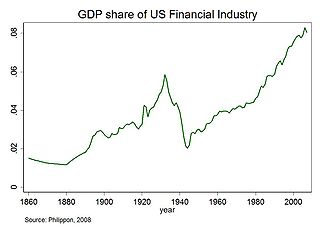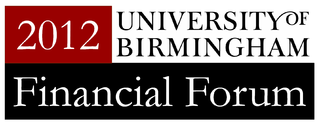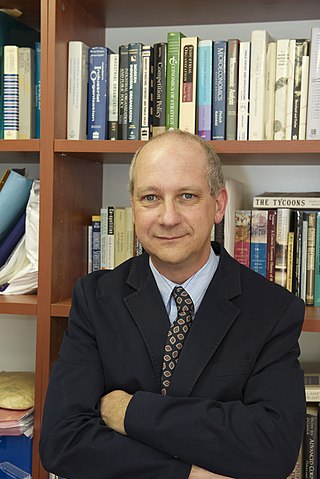An economist is a professional and practitioner in the social science discipline of economics.

The 1997 Asian financial crisis was a period of financial crisis that gripped much of East and Southeast Asia during the late 1990s. The crisis began in Thailand in July 1997 before spreading to several other countries with a ripple effect, raising fears of a worldwide economic meltdown due to financial contagion. However, the recovery in 1998–1999 was rapid, and worries of a meltdown quickly subsided.
A transition economy or transitional economy is an economy which is changing from a centrally planned economy to a market economy. Transition economies undergo a set of structural transformations intended to develop market-based institutions. These include economic liberalization, where prices are set by market forces rather than by a central planning organization. In addition to this trade barriers are removed, there is a push to privatize state-owned enterprises and resources, state and collectively run enterprises are restructured as businesses, and a financial sector is created to facilitate macroeconomic stabilization and the movement of private capital. The process has been applied in China, the former Soviet Union and Eastern bloc countries of Europe and some Third world countries, and detailed work has been undertaken on its economic and social effects.

Financial contagion refers to "the spread of market disturbances – mostly on the downside – from one country to the other, a process observed through co-movements in exchange rates, stock prices, sovereign spreads, and capital flows". Financial contagion can be a potential risk for countries who are trying to integrate their financial system with international financial markets and institutions. It helps explain an economic crisis extending across neighboring countries, or even regions.

Mahmoud Mohieldin, is an economist with more than 30 years of experience in international finance and development. He is the UN Climate Change High-Level Champion for Egypt. He is an Executive Director at the International Monetary Fund. He has been the United Nations Special Envoy on Financing the 2030 Sustainable Development Agenda since February 2020. He was the Minister of Investment of Egypt from 2004-2010, and most recently, served as the World Bank Group Senior Vice President for the 2030 Development Agenda, United Nations Relations and Partnerships. His roles at the World Bank also included Managing Director, responsible for Human Development, Sustainable Development, Poverty Reduction and Economic Management, Finance and Private Sector Development, and the World Bank Institute; World Bank President's Special Envoy on the Millennium Development Goals (MDGs), the Post-2015 Development Agenda, and Financing for Development; and Corporate Secretary and Executive Secretary to the Development Committee of the World Bank Group's Board of Governors. Dr Mohieldin also served on several Boards of Directors in the Central Bank of Egypt and the corporate sector. He was a member of the Commission on Growth and Development and was selected for the Young Global Leader of the World Economic Forum in 2005. His professional experience extends into the academic arena as a Professor of Economics and Finance at the Faculty of Economics and Political Science, Cairo University and as a visiting professor at several renowned Universities in Egypt, Korea, the UAE, the UK and the USA. He is a member of the International Advisory Board of Durham University Business School. He also holds leading positions in national, regional and international research centres and associations. He has authored numerous publications and articles in leading journals in the fields of economics, finance and development.
Eyitayo Lambo was appointed the Nigerian Federal Minister of Health in July 2003, holding office until May 2007 during the second term of the presidency of Olusegun Obasanjo.
dollarDEX, founded in 1998 in Singapore, is one of the earliest financial supermarkets in Asia. It offers clients a selection of products—loans, insurance, investments, financial advice—sourced from banks, insurance companies, and fund managers around the world.

Simeon Dyankov is a Bulgarian economist. From 2009 to 2013, he was the deputy prime minister and minister of finance of Bulgaria in the government of Boyko Borisov. He has been a vocal supporter of Bulgaria's entry into the Eurozone. Before his cabinet appointment, he was the chief economist of the finance and private sector vice-presidency of the World Bank.

Nasser Saidi is a Lebanese politician and economist who served as the minister of economy and industry and the Vice Governor for the Lebanese central banks for several terms in the last decade of the 20th century.

Financialization is a term sometimes used to describe the development of financial capitalism during the period from 1980 to present, in which debt-to-equity ratios increased and financial services accounted for an increasing share of national income relative to other sectors.

Shankar P. Sharma, is a senior Economist and Diplomat who is currently serving as the Ambassador of Nepal to India. He was the Ambassador of Nepal to the United States from 2009-2014. Dr. Sharma served as the Vice-Chairman of the National Planning Commission from 2002 to 2006. He has a Ph.D. in economics from the University of Hawaii.
Johannes F. Linn is a nonresident senior fellow in the Center for Sustainable Development, housed within the Global Economy and Development program at the Brookings Institution. He is also a distinguished resident scholar of the Emerging Markets Forum, senior advisor at the Results for Development Institute (R4D) and senior research fellow at the International Initiative for Impact Evaluation (3ie).
Liliana Rojas-Suarez is a Peruvian economist, who is currently a Senior Fellow and Director of the Latin American Initiative at the Center for Global Development. She is also Core Faculty for the Program in Economic Policy Management at School of International and Public Affairs, Columbia University and the President of the Latin American Committee on Macroeconomic and Financial Issues (CLAAF). In 2012, Rojas-Suarez was named Economist of the Year by Lima’s Chamber of Commerce.

The University of Birmingham Financial Forum is a student-run conference for hundreds of students that was founded in 2011 and held at the University of Birmingham, United Kingdom.
Masahiko Aoki was a Japanese economist, Tomoye and Henri Takahashi Professor Emeritus of Japanese Studies in the Economics Department, and Senior Fellow of the Stanford Institute for Economic Policy Research and Freeman Spogli Institute for International Studies at Stanford University. Aoki was known for his work in comparative institutional analysis, corporate governance, the theory of the firm, and comparative East Asian development.

Erik Berglöf is a Swedish economist, currently the Chief Economist of the Asian Infrastructure Investment Bank (AIIB), the Beijing-based multilateral development bank established in 2016 with a mission to improve social and economic outcomes in Asia. In March 2019 Erik Berglöf was appointed to the European Council's High Level Group of Wise Persons on the European financial architecture for development where Berglöf and eight other economists will suggest changes to the EU's development finance structure. In 2017–2018 Erik Berglöf served on the secretariat of the G20 Eminent Persons Group on Global Financial Governance and on the Governing Board of the Institute for New Economic Thinking in New York.
Edward J. Kane was an American economist and writer. He was a long-time student of incentive conflict in financial regulation and in crisis-management policies. His writing contends that too-big-to-fail policies are rooted in the cultural norms of major central banks around the world.

Yishay Yafeh is an Economist and a Professor of Finance at the Hebrew University of Jerusalem School of Business Administration in Israel. Between 2010–2012 he was the vice- dean of the Hebrew University School of Business Administration and the Dean of the School between 2012–2016.

Asli Demirgüç-Kunt is a Turkish economist. She is a non-resident Fellow at the Center for Global Development and a former chief economist of the Europe and Central Asia Region of The World Bank. During her 33-year career at The World Bank, she also served as the Director of Research, Director of Development Policy, and the Chief Economist of the Finance and Private Sector Development Network, conducting research and advising on financial and private sector development issues. She has authored more than 100 research papers, as well as books, is widely published in academic journals, and is among the most-cited researchers in the world. Demirguc-Kunt has been named one of the top 10 women in economics as of June 2015 and one of the top 10 percent of Female Economists for her contributions to the field of economics.
Luc Laeven is a Dutch economist, director-general of the research department of the European Central Bank 2015–present. Previously he held senior posts at the International Monetary Fund and the World Bank. He was also a Professor Finance at Tilburg University from 2009 to 2019. He has been a research fellow at the Centre for Economic Policy Research in London since 2009.












